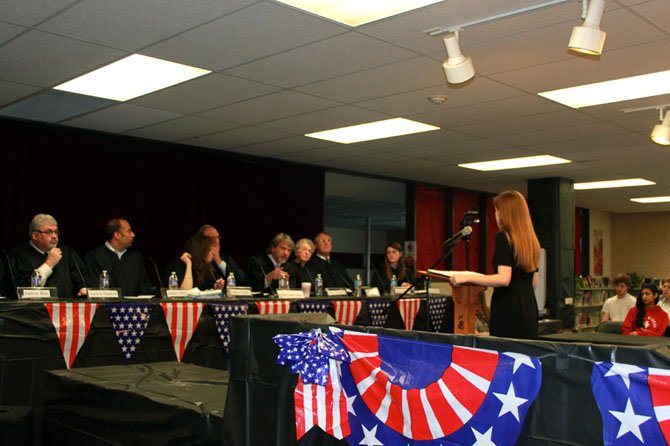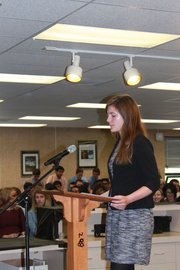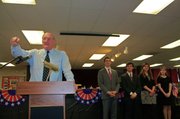A mock debate over cell phone privacy and the law drew hundreds of students, parents and even some very distinguished guests to Langley High School’s library last week.
Langley High’s 22nd annual Case Day explored Riley vs. California on April 8, a case on the Supreme Court’s current docket that allowed students to debate whether a cell phone - which holds a wealth of personal information - can be searched without a warrant.
Seniors Anna Cox and Grace Sununu served as the case petitioners. Seniors Ben Parker and William Miner played the respondents.
“In the same way an empty house has the same amount of protection as a full house, an empty cell phone has the same amount of protection as a full cell phone,” Cox explained to a panel of mock justices played by students, local law experts and former U.S. Supreme Court Clerk William K. Suter.
“This event allows the student body to delve into a controversial national issue and tackle analysis and argument on a professional level, and provides the unique opportunity to work alongside and hear from such professionals,” according to the event pamphlet.
However, the event affected the students more personally than the statement says. Most students that age have only had cell phones for a few years, if they have one at all.
PETITIONER COX explained that even a diary that was seized from someone arrested could not have as much information as a cell phone, which often serves as a handheld computer for many people. In addition to the amount of data that can be stored, the phone can also receive real-time texts and emails that could be incriminating to the person who was arrested.
“Justice” Caroline E. Costle, who founded law practice Greensberg Costle, worried the person - who might be a lawyer - might receive a confidential text from a client or information about them having an affair. This information might not be relevant to the arrest, but is an invasion of their privacy, she said.
Miner, representing California, said the process of getting a warrant can be unpredictable and important information could be deleted if not searched right away. In addition, the physical proximity of the phone to the person would be an important factor to whether it would be searched.
During his response to the oral argument, Suter said Case Day is an event that should take place in every high school in the country.
“I think Case Day is the finest educational program of its kind,” he said.
He answered questions about his appointment as a Supreme Court Clerk and his service as a general in the Army. Suter also told the students that they should attend law school if they don’t know what they want to do as an occupation yet.
“The number of people applying for law school has been decreasing over the last few years,” he said. “Saying there are too many lawyers is like saying there are too many smart people.”
STUDENTS SAT ATTENTIVELY through his responses about the case and his work and laughed when he said he went to basic training with Elvis Presley.
“He was very entertaining and had very funny stories about how the Supreme Court works behind the scenes,” said senior Rachel Mayman. “He was inspiring to all our the students interested in politics and business, preaching about working hard and seizing opportunities.”


